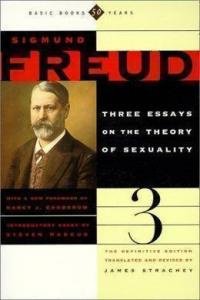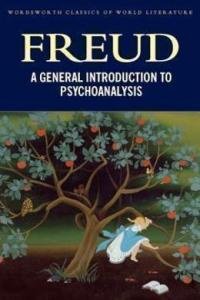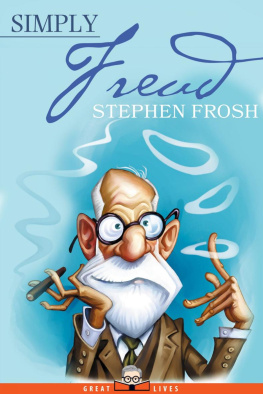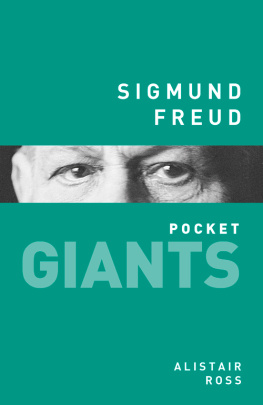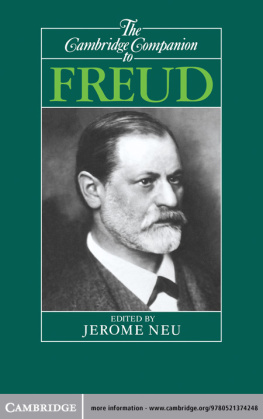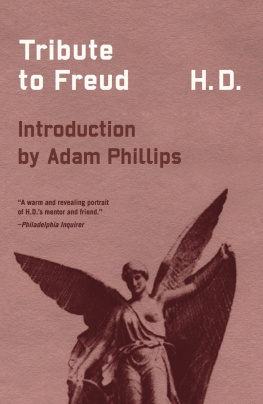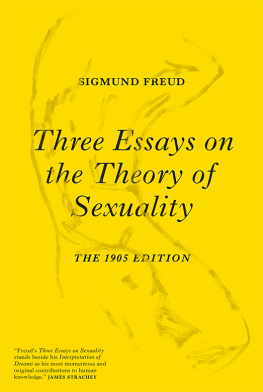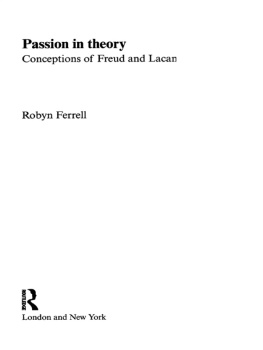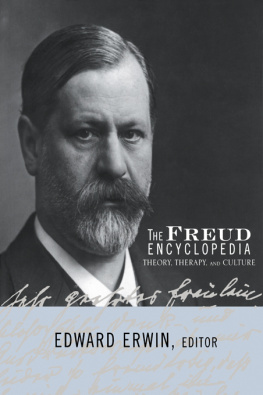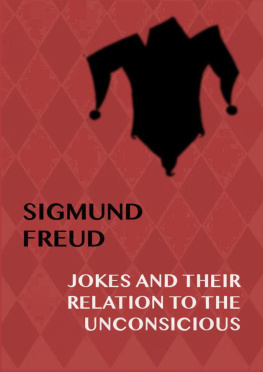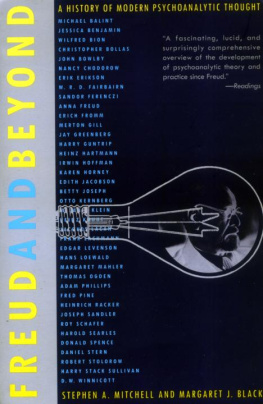Three Essays on the Theory of Sexuality
Sigmund Freud
Introduction to Translation
The somewhat famous "Three Essays," which Dr. Brill is here bringing to the attention of an Englishreading public, occupybrief as they arean important position among the achievements of their author, a great investigator and pioneer in an important line. It is not claimed that the facts here gathered are altogether new. The subject of the sexual instinct and its aberrations has long been before the scientific world and the names of many effective toilers in this vast field are known to every student. When one passes beyond the strict domains of science and considers what is reported of the sexual life in folkways and artlore and the history of primitive culture and in romance, the sources of information are immense. Freud has made considerable additions to this stock of knowledge, but he has done also something of far greater consequence than this. He has worked out, with incredible penetration, the part which this instinct plays in every phase of human life and in the development of human character, and has been able to establish on a firm footing the remarkable thesis that psychoneurotic illnesses never occur with a perfectly normal sexual life. Other sorts of emotions contribute to the result, but some aberration of the sexual life is always present, as the cause of especially insistent emotions and repressions.
The instincts with which every child is born furnish desires or cravings which must be dealt with in some fashion. They may be refined ("sublimated"), so far as is necessary and desirable, into energies of other sortsas happens readily with the playinstinctor they may remain as the source of perversions and inversions, and of cravings of new sorts substituted for those of the more primitive kinds under the pressure of a conventional civilization. The symptoms of the functional psychoneuroses represent, after a fashion, some of these distorted attempts to find a substitute for the imperative cravings born of the sexual instincts, and their form often depends, in part at least, on the peculiarities of the sexual life in infancy and early childhood. It is Freud's service to have investigated this inadequately chronicled period of existence with extraordinary acumen. In so doing he made it plain that the "perversions" and "inversions," which reappear later under such striking shapes, belong to the normal sexual life of the young child and are seen, in veiled forms, in almost every case of nervous illness.
It cannot too often be repeated that these discoveries represent no fanciful deductions, but are the outcome of rigidly careful observations which any one who will sufficiently prepare himself can verify. Critics fret over the amount of "sexuality" that Freud finds evidence of in the histories of his patients, and assume that he puts it there. But such criticisms are evidences of misunderstandings and proofs of ignorance.
Freud had learned that the amnesias of hypnosis and of hysteria were not absolute but relative and that in covering the lost memories, much more, of unexpected sort, was often found. Others, too, had gone as far as this, and stopped. But this investigator determined that nothing but the absolute impossibility of going further should make him cease from urging his patients into an inexorable scrutiny of the unconscious regions of their memories and thoughts, such as never had been made before. Every species of forgetfulness, even the forgetfulness of childhood's years, was made to yield its hidden stores of knowledge; dreams, even though apparently absurd, were found to be interpreters of a varied class of thoughts, active, although repressed as out of harmony with the selected life of consciousness; layer after layer, new sets of motives underlying motives were laid bare, and each patient's interest was strongly enlisted in the task of learning to know himself in order more truly and wisely to "sublimate" himself. Gradually other workers joined patiently in this laborious undertaking, which now stands, for those who have taken pains to comprehend it, as by far the most important movement in psychopathology.
It must, however, be recognized that these essays, of which Dr. Brill has given a translation that cannot but be timely, concern a subject which is not only important but unpopular. Few physicians read the works of v. KrafftEbing, Magnus Hirschfeld, Moll, and others of like sort. The remarkable volumes of Havelock Ellis were refused publication in his native England. The sentiments which inspired this hostile attitude towards the study of the sexual life are still active, though growing steadily less common. One may easily believe that if the facts which Freud's truthseeking researches forced him to recognize and to publish had not been of an unpopular sort, his rich and abundant contributions to observational psychology, to the significance of dreams, to the etiology and therapeutics of the psychoneuroses, to the interpretation of mythology, would have won for him, by universal acclaim, the same recognition among all physicians that he has received from a rapidly increasing band of followers and colleagues.
May Dr. Brill's translation help toward this end.
There are two further points on which some comments should be made. The first is this, that those who conscientiously desire to learn all that they can from Freud's remarkable contributions should not be content to read any one of them alone. His various publications, such as "The Selected Papers on Hysteria and Other Psychoneuroses," and the various short essays in the four Sammlungen kleiner Schriften, not only all hang together, but supplement each other to a remarkable extent. Unless a course of study such as this is undertaken many critics may think various statements and inferences in this volume to be far fetched or find them too obscure for comprehension.
The other point is the following: One frequently hears the psychoanalytic method referred to as if it was customary for those practicing it to exploit the sexual experiences of their patients and nothing more, and the insistence on the details of the sexual life, presented in this book, is likely to emphasize that notion. But the fact is, as every thoughtful inquirer is aware, that the whole progress of civilization, whether in the individual or the race, consists largely in a "sublimation" of infantile instincts, and especially certain portions of the sexual instinct, to other ends than those which they seemed designed to serve. Art and poetry are fed on this fuel and the evolution of character and mental force is largely of the same origin. All the forms which this sublimation, or the abortive attempts at sublimation, may take in any given case, should come out in the course of a thorough psychoanalysis. It is not the sexual life alone, but every interest and every motive, that must be inquired into by the physician who is seeking to obtain all the data about the patient, necessary for his reeducation and his cure. But all the thoughts and emotions and desires and motives which appear in the man or woman of adult years were once crudely represented in the obscure instincts of the infant, and among these instincts those which were concerned directly or indirectly with the sexual emotions, in a wide sense, are certain to be found in every case to have been the most important for the endresult.
JAMES J. PUTNAM.
BOSTON, August 23, 1910.
Author's Preface to the Second Edition
Although the author is fully aware of the gaps and obscurities contained in this small volume, he has, nevertheless, resisted a temptation to add to it the results obtained from the investigations of the last five years, fearing that thus its unified and documentary character would be destroyed. He accordingly reproduces the original text with but slight modifications, contenting himself with the addition of a few footnotes. For the rest, it is his ardent wish that this book may speedily become antiquatedto the end that the new material brought forward in it may be universally accepted, while the shortcomings it displays may give place to juster views.

